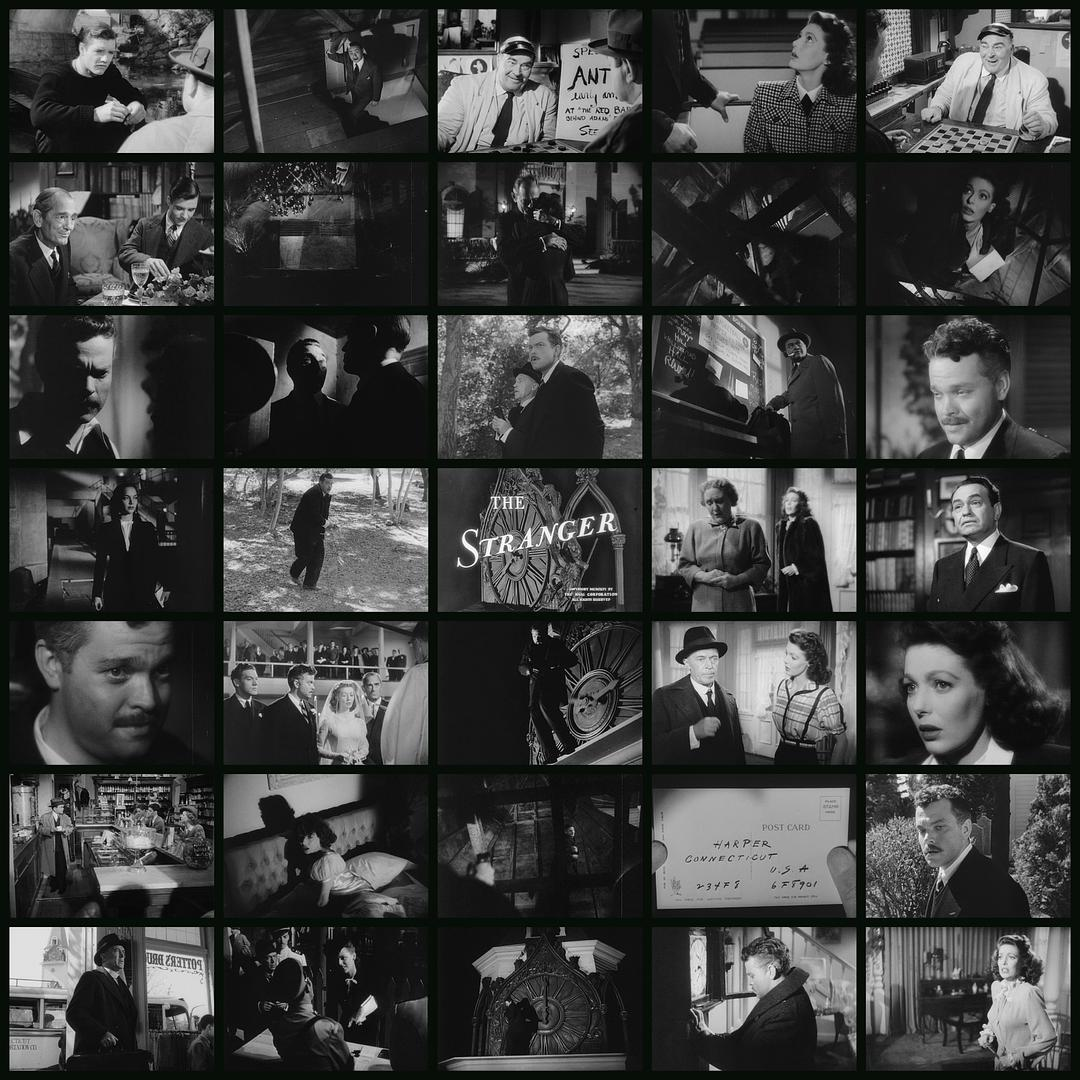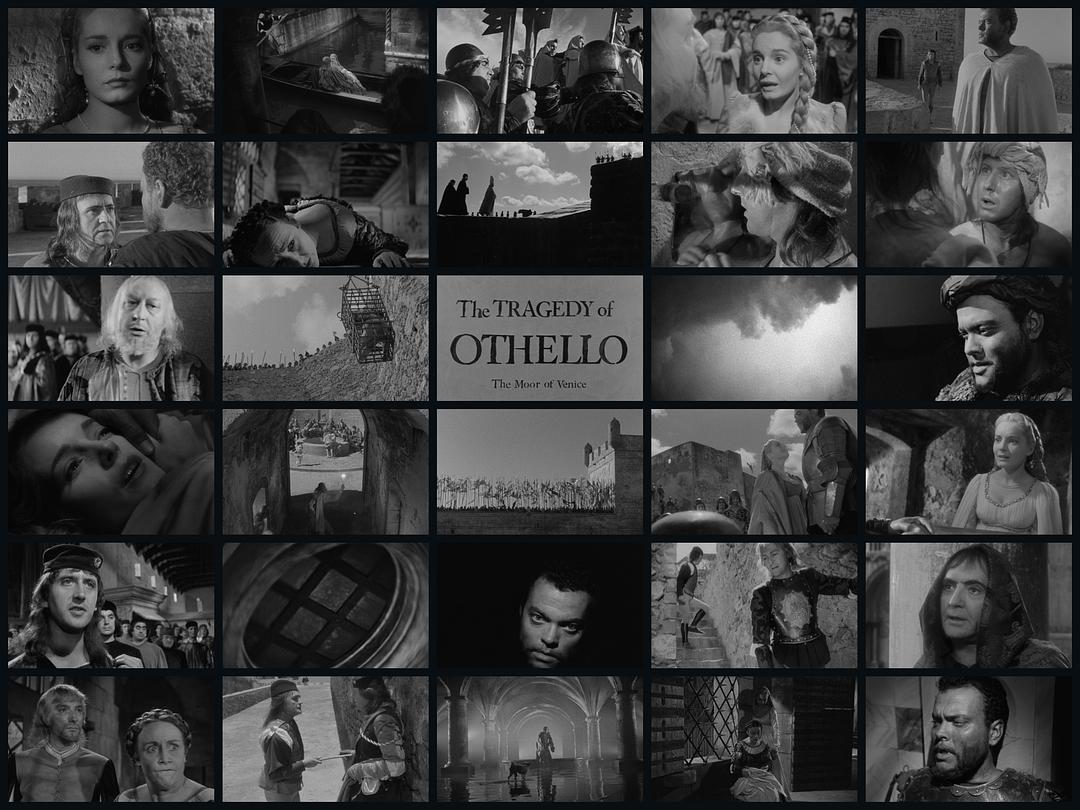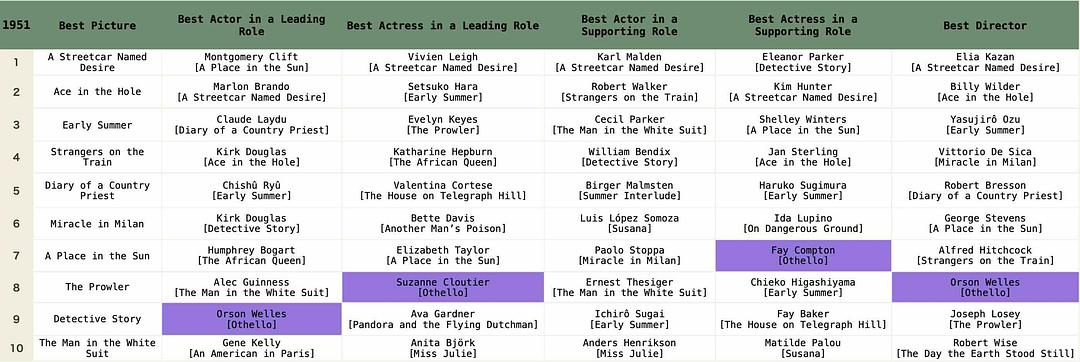1、米歇尔·麦克利亚姆莫伊尔,罗伯托·库特,奥逊·威尔斯,苏珊·克卢捷,希尔顿·爱德华兹,尼古拉斯·布鲁斯,迈克尔·劳伦斯,费伊·康普顿,多利斯·道灵 主演的电影《奥赛罗》来自哪个地区?
爱奇艺网友:电影《奥赛罗》来自于美国,意大利,法国,摩洛哥地区。
2、《奥赛罗》是什么时候上映/什么时候开播的?
本片于1951年在美国,意大利,法国,摩洛哥上映,《奥赛罗》上映后赢得众多观众的喜爱,网友总评分高达837分,《奥赛罗》具体上映细节以及票房可以去百度百科查一查。
3、电影《奥赛罗》值得观看吗?
《奥赛罗》总评分837。月点击量8次,是值得一看的爱情片。
4、《奥赛罗》都有哪些演员,什么时候上映的?
答:《奥赛罗》是1951-11-28(意大利)上映的爱情片,由影星米歇尔·麦克利亚姆莫伊尔,罗伯托·库特,奥逊·威尔斯,苏珊·克卢捷,希尔顿·爱德华兹,尼古拉斯·布鲁斯,迈克尔·劳伦斯,费伊·康普顿,多利斯·道灵主演。由导演奥逊·威尔斯携幕后团队制作。
5、《奥赛罗》讲述的是什么故事?
答:爱情片电影《奥赛罗》是著名演员米歇尔 代表作,《奥赛罗》免费完整版1951年在美国,意大利,法国,摩洛哥隆重上映,希望你能喜欢奥赛罗电影,奥赛罗剧情:奥赛罗(奥逊·威尔斯OrsonWelles饰)生来高大威武,是一员猛将。某日,他遇见了元老的女儿苔丝狄蒙娜(SuzanneCloutier饰),一见钟情的两人迅速坠入了爱河。然而,巨大的年龄差距让两人的爱情遭到了众人的强烈反对,婚事亦遥遥无期,两个相爱的人决定私定终身。阴险狡诈的伊阿古(MicheálMacLiammóir饰)将风头正劲的奥赛罗视为眼中钉,企图除之而后快。在向元老告密的阴谋失败之后,伊阿古开始挑拨奥赛罗和苔丝狄蒙娜之间的感情,他伪造了副将凯斯奥(MichaelLaurence饰)和苔丝狄蒙娜之间的定情信物,使得奥赛罗信以为真。愤怒的奥赛罗将苔丝狄蒙娜掐死,却在之后得知了整个事件的真相,悲痛和悔恨之中,奥赛罗选择了死亡
我对奥赛罗这部剧没有了解,本来想盲看电影,结果看了前20分钟实在没忍住去了解了一下剧情背景才接着看完。电影的紧张窒息感,在黑白画面下尤为压迫,再加上莎翁对白,对于没看过奥赛罗的我来说实在有些难以承受。
始终觉得这是一部特别的莎翁剧,没有那么多对人生意义的思考,而是对罪恶欲望的描绘,相比较于其他莎翁剧有一种特别的黑暗魅力。
伊阿古,一切邪恶欲念的化身,在剧中仿佛就是魔鬼的化身,鄙视一切美好的感情,让嫉妒吞噬自己的心灵并且用嫉妒去毒害他人。但这么恶毒的人剧里所有的角色却都拿他当世间顶诚实的人,为什么呢?我觉得是因为他可以洞悉人们内心的嫉妒欲望,而所有人或多或少都有些邪恶的想法,他与邪恶为友所以知晓所有人的邪恶。依据对方最渴求的东西来达到操控对方感情的目的。
奥赛罗,英勇善战的将军,但内心却始终有自卑的情结。苔丝狄蒙娜不仅是他爱情的对象,还是他融入威尼斯,融入白人社会的心理寄托。当爱情破灭,幻想也被打破,他只能迎来自我灭亡。
我真的爱这部剧的打光和镜头画面,威尔逊天才毋庸置疑。演员方面,苔丝狄蒙娜就是木头美人,我真的没有认出来奥赛罗是威尔逊,还以为真的找了黑人演。伊阿古是我觉得最出彩的角色了。
电影太短是我最遗憾的一点了,但这样的同时也使这部电影显得精悍,毫无冗杂。好多情节都没有拍出来显得剧情发展过快,缺少人物心理描写让人物性格魅力丧失了不少,但还是要赞。
奥逊·威尔斯的《奥赛罗》是一次大胆而深刻的电影探险,它将莎士比亚的不朽作品与电影媒介的独特语言结合起来。在这部1952年的作品中,威尔斯不仅执导,更在其中扮演了饱受煎熬的莫尔人将军奥赛罗,将其呈现为一个既壮丽又深具悲剧色彩的角色。
黑白影像是本片的一大特色,威尔斯利用这一点来强化故事的情绪强度。黑与白之间的对比,不仅是视觉上的,也象征着人性中善与恶、信任与背叛的对立。影片中的每一帧都充满了表现主义风格的影子,这种风格在电影中用以表达人物内心世界的混乱和动荡。
威尔斯以他特有的镜头语言,配合光影的巧妙运用,让观众感受到了奥赛罗内心的风暴。他的奥赛罗是一个权力和威严背后所隐藏的脆弱性的象征,而这种脆弱性最终被爱妻苔丝狄蒙娜的假象所触发的嫉妒所摧毁。
影片的配乐同样不可忽视,它恰到好处地强化了画面的紧张感和情感的波动。在没有彩色和现代特效的年代,威尔斯的这部作品通过其精湛的艺术手法,证明了优秀的叙事和表演是电影艺术的核心。
在评价这部电影时,不得不提的是威尔斯对于伊阿古角色的演绎。他通过伊阿古的狡猾和阴谋,展现了一个深刻的反英雄形象。威尔斯通过他的表演让人们看到了伊阿古的复杂性,他不仅是一个单纯的反派,更是人性阴暗面的一面镜子。
在总体上,奥逊·威尔斯的《奥赛罗》不仅是对原著的忠实呈现,更是对莎士比亚戏剧在电影中表现形式的一次深刻探索。它是电影和戏剧艺术完美结合的证明,也是威尔斯导演多才多艺的又一力作。对于喜爱古典文学和电影艺术的观众来说,这部影片无疑是一次不容错过的视听盛宴。
说起莎翁四大悲剧里的反派,《哈姆雷特》是叔叔,《麦克白》是老婆,《李尔王》是女儿,《奥赛罗》则是仆人。但换汤不换药,坏人的动机都是(对权力的)贪婪,“好人”(主角)的人性弱点则被利用和放大,终酿成悲剧。不过说起来,《奥赛罗》中教科书般的造谣小人伊阿古,其动机在不同版本里其实是不太一样的。在钦齐奥的原著小说《一位摩尔上尉》中,他是追求苔丝狄蒙娜未果而因爱生恨;在莎士比亚的剧本中,他是嫉恨奥赛罗提拔凯西奥;而本片中,他更多的是出于对奥赛罗个人的偏见。各版本并无高下之分,反正坏人有一千个理由一万种方式做坏事就对了。但不要忘了杀害苔丝狄蒙娜的毕竟是奥赛罗,他听信谗言、妒火中烧、心狠手辣、直至大错铸成。悲剧的客观原因是遇人不淑和偏听偏信,主观原因是对爱人的占有欲和嫉妒心,但其根源实则是他内心深处的自卑感(地位、种族等)。比如开场不久奥赛罗曾当着众人之面讲述苔丝狄蒙娜如何被自己吸引并心甘情愿跟自己私奔,驳斥了岳父的巫术指控。现在看来那些话他更多是说给自己听的,用来增加自信,只可惜那样的意气风发也抵不过流言蜚语。剧中他在得知真相后选择了自杀。我总在想,究竟是让他知道实情后自责还是蒙在鼓里独存更加悲剧?
奥森·韦尔斯几年前刚自制自编自导自演了《麦克白》,接着就盯上了《奥赛罗》。不过本片因经费短缺而数次停拍,是靠着韦尔斯到处拍戏(包括一个舞台剧版本的《奥赛罗》)筹钱才得以完成。相关幕后故事在多年后的纪录片《Filming Othello》中由韦尔斯亲自披露,那也是他的最后一部长片。最终,这个以威尼斯为背景的古装片在戛纳电影节获得评审团奖(当年的“金棕榈”),这似乎也是韦尔斯的电影在主流电影节拿下的唯一一个最高奖。

THE STRANGER is Welles's third feature, his sally into film noir about catching a top-brass Nazi fugitive in a small town in Connecticut. E.G. Robinson is Mr. Wilson, an agent of the United Nations War Crimes Commission, who plays a lone hand in tracking Franz Kinder (Welles), a notorious Nazi officer. Reinventing himself as Charles Rankin, a prep school teacher, Franz has destroyed all the implicating evidences of his true identity, including cold-bloodedly murdering a former associate Konrad Meinike (Shayne), and is freshly married to Mary (Young), daughter of Supreme Court Justice Adam Longstreet (Merivale).
Franz's identity-erasing measures are almost ironclad, save for one catch, that Mary has met Konrad once before he offs the latter (whose plea of Catholic salvation is a flea in his ears). It takes another whopper for him to justify Konrad's advent in the sleepy town and to appease Mary's doubt. Mean time, Mr. Wilson closes in on him after picking up breadcrumbs (a throwaway comment about Karl Marx is his Freudian slip).
It is no doubt that Charles is Franz, guilty as charged. What THE STRANGER plays up to is Mary's painful realization that she has fallen in love and tied the knot with an inhuman war criminal. Young rises to the occasion poignantly as if she were a heroine heading to perdition for a noble cause, and Welles colors Franz with a halting reluctancy, eking out a modicum of humanity despite his pitch-dark past.
Psychological means is clinically applied to vouchsafe Mary enough time to come to terms with the revelation, even it is at the expense of her own safety, a plot contrivance never sits comfortable with viewers. You may well expect Judge Longstreet to do something after he gets wise that her daughter is living with a Nazi and her life is in jeopardy, but no. It is only courtesy to Sara (Wentworth), Mary's loyal servant, who makes a big fuss that unwittingly keeps Mary out of harm's way.
All the drama culminates in the church belfry, where a wonky ladder, a pistol or a fall can leave one pushing up the daisies, however the sword of justice wielding by a clock figurine ends up more lethal than usual. THE STRANGER is characteristically steeped in Welles's deep-focused, suspense-infused ambience and shadow-play, even if its story errs on the side of righteous doctrinairism (en passant, it is the very first film showing graphic footage of Nazi concentration camps) and some giant lacuna is felt between the opening nightmarish sequences with a timorous Konrad and the main course.

Welles obtains more creative control in OTHELLO, his second Bard adaptation after MACBETH (1948), which Yours Truly unwisely chooses as the entry into Welles's corpus during my salad days. But the production is a bumpy road, three years in the making with changed cast members and shot in various locations. Yet, the final version debuts in Cannes and nabs the top prize (the precursor of Palme d'or).
Confining the running time within a lean 90 minutes, Welles trims the play down to its kernel. Othello (Welles in blackface, whose gradation varies constantly) is a Moorish military commander of the Venetian Army, fighting against Ottoman Turks in defense of Cyprus. His miscegenation with Desdemona (a doe-eyed Cloutier exemplifies a wronged beaut subjugated to heartrending resignation) triggers displeasure and envy (or more overtly, racism) from his ensign Iago (Liammóir, impeccable locution aside, he is monotonously threatening and rebarbative), who plants the seed of distrust in Othello through a single handkerchief, fabricating a tryst between Desdemona and Cassio (Laurence), Othello's loyal captain. Riled by cuckoldry, Othello soon gives in to his murderous rage and all hell is let loose.
Bookended with a solemn funereal marching with astonishing chiaroscuro compositions, Welles's OTHELLO roundly condenses the Shakespearean rhetorical wording almost to the extent of inexplicability in terms of narrative logic, and is more apt to express ideas, present events and signal emotion through visual impact (expressive close-ups, the motif of crossed bars, often in their shadows, etc.).
Othello's delusion, Desdemona's virtue and Iago's treacherousness, are the trinity of human traits (albeit from a rather masculine perspective), each counterpoints others with a tangy edge of sharpness. Welles's Othello is most eloquent when he is in distress and required to magnify the inner turmoil, also Fay Compton's Emilia, Iago's wife, manages to upstage everyone else in the crucial truth-baring sequences, and her last gasp is a nugget of Shakespearian tragedy, the truth that kills.
In general, Welles the actor doesn't possess as much self-assurance or panache and as Welles the director, whose sleight of hand only manifests in short measure here. It is safe to profess that OTHELLO can be one's gateway film to get a glimpse of his extraordinariness, if you start with MACBETH (1948), such guarantee shall be annulled and you are at your own peril.
referential entries: John Huston's KEY LARGO (1948, 7.2/10); Welles's MACBETH (1948, 5.3/10); Sergei M. Eisenstein's IVAN THE TERRIBLE, PART 1 (1944, 8.1/10).

Title: The Stranger
Year: 1946
Genre: Crime, Drama, Film-Noir
Country: USA
Language: English, Spanish, French
Director: Orson Welles
Screenwriters: Anthony Veiller, Victor Trivas, Decla Dunning
Music: Bronislau Kaper
Cinematography: Russell Metty
Editor: Ernest J. Nims
Cast:
Edward G. Robinson
Loretta Young
Orson Welles
Richard Long
Billy House
Martha Wentworth
Philip Merivale
Konstantin Shayne
Byron Keith
Rating: 7.2/10

Title: Othello
Original Title: The Tragedy of Othello: The Moor of Venice
Year: 1951
Genre: Drama
Country: USA, Morocco, Italy
Language: English
Director: Orson Welles
Screenwriters: Orson Welles, Jean Sacha
based on the play by William Shakespeare
Music: Alberto Barberis, Angelo Francesco Lavagnino
Cinematography: G.R. Aldo, Anchise Brizzi, George Fanto, Alberto Fusi, Oberdan Troiani
Editors: Jenö Csepreghy, Renzo Lucido, William Morton, Jean Sacha
Cast:
Orson Welles
Micheál MacLiammóir
Suzanne Cloutier
Fay Compton
Robert Coote
Michael Laurence
Hilton Edwards
Nicholas Bruce
Jean Davis
Doris Dowling
Rating: 7.3/10
看片中,一直讨厌与伊阿古的奸诈谗言,导致男女主角看似浪漫而冲破一切枷锁的爱情被毁双双死亡。
看完后,反思是奥赛罗的性格缺陷、自卑轻信致其战场上战无不胜的英雄止步于生活中暗枪,苔丝狄蒙娜更是单纯地将人生全部绑在爱情婚姻上,一有风吹草动便岌岌可危。人生的道路上无法阻止身边的小人、耳边的谗言,但坚持独立思维,不以别人的思维模式为定势才能主宰自己。
得力于莎翁的悲剧经典,对白很有诗意,场面也颇为壮观。